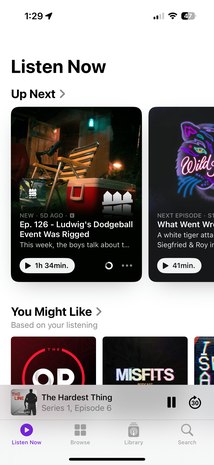| Apple Podcasts | |
|---|---|
| | |
 Screenshot of the Podcasts app in iOS 26 | |
| Developer | Apple |
| Initial release | iOS: June 26, 2012 tvOS: January 26, 2016 watchOS: September 17, 2018 HomePod: February 9, 2018 macOS: October 7, 2019 Amazon Echo: December 13, 2019 Web app: August 19, 2024 |
| Stable release | iOS 15.1 / October 25, 2021 |
| Operating system | iOS 10 and later iPadOS 10 and later watchOS 5.1 and later tvOS 9.1.1 and later macOS Catalina and later Windows (as part of iTunes) Web app and visionOS 1 and later |
| Predecessor | iTunes (macOS) |
| License | Freeware |
| Website | apple.com/apple-podcasts |
| Part of a series on |
| macOS |
|---|
Apple Podcasts (known as simply Podcasts in Apple operating systems) is an audio streaming service and media player application developed by Apple for playing podcasts. Apple began supporting podcasts with iTunes 4.9 released in June 2005 and launched its first standalone mobile app in 2012. The app was later pre-installed with iOS beginning October 2014. The Apple Podcasts directory features more than two million shows. [1] Apple Podcasts is available on iOS, iPadOS, macOS, watchOS, tvOS, CarPlay, visionOS, Microsoft Windows operating systems, web browsers, and on Amazon Alexa devices.